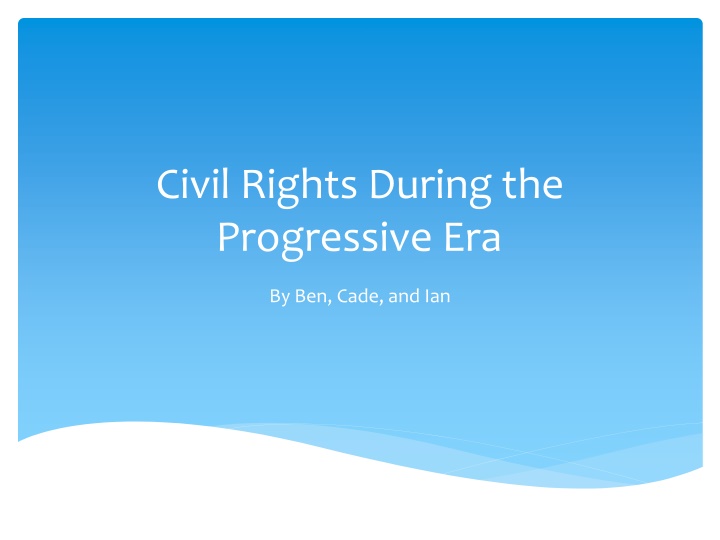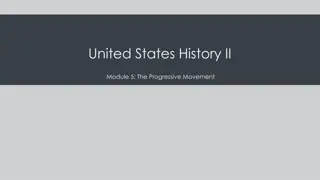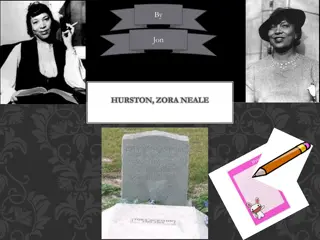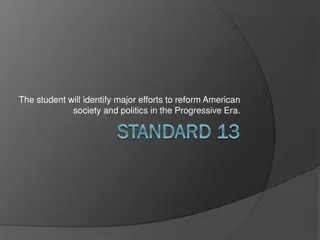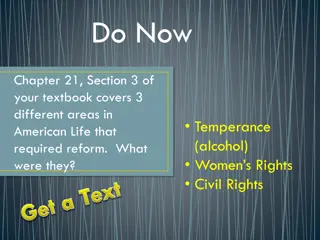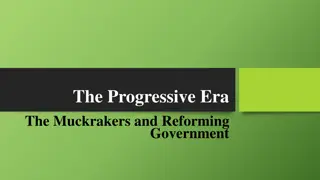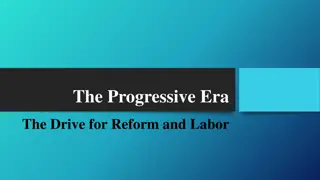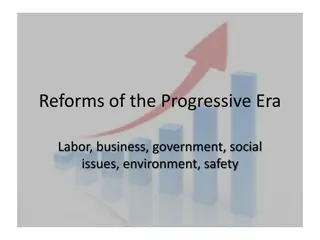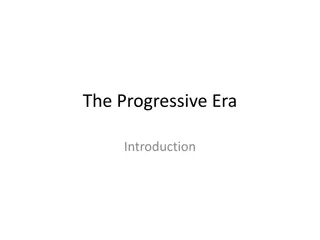Challenges Faced by African Americans During the Progressive Era
African Americans in the Progressive Era faced significant challenges in education, employment, and social acceptance. They were oppressed, segregated in schools, limited to non-skilled jobs with lower wages, and were victims of racial violence and discrimination, such as lynching. Leaders like Booker T. Washington advocated for immediate self-improvement rather than long-term social change. These struggles laid the groundwork for the Civil Rights Movement that would follow.
Download Presentation

Please find below an Image/Link to download the presentation.
The content on the website is provided AS IS for your information and personal use only. It may not be sold, licensed, or shared on other websites without obtaining consent from the author.If you encounter any issues during the download, it is possible that the publisher has removed the file from their server.
You are allowed to download the files provided on this website for personal or commercial use, subject to the condition that they are used lawfully. All files are the property of their respective owners.
The content on the website is provided AS IS for your information and personal use only. It may not be sold, licensed, or shared on other websites without obtaining consent from the author.
E N D
Presentation Transcript
Civil Rights During the Progressive Era By Ben, Cade, and Ian
What is the Problem? Before the civil rights movement, African Americans were horribly oppressed, educationally, economically, and socially.
Educational Issues Most African Americans weren t enrolled in school during the late 1800 s and early 1900 s. In 1990 people who were enrolled in school, from ages five to nineteen, only thirty percent of them were African American or other minorities. African Americans allowed in school were segregated, they could only designated bathrooms, water fountains, and were forced to take classes with other African Americans.
Economical Issues Most African Americans could only obtain non-skilled occupations, mostly in agriculture. The main reason why most African Americans worked at farms is because the majority of the African American population was concentrated in the south and were not educated or wealthy. The wages of African Americans, for both men and woman, were lower, almost half, than that of white people.
Social Issues Lynching was rampant across the southern states. From 1882 to 1968 about 4743 people were lynched in the United States, 72.7% were African Americans. During the early 1900 s the KKK was at its peak and caused a lot of violence in the south. In Plessy v Ferguson the supreme court decided that the doctrine of separate but equal should continue to be upheld. African Americans couldn t marry a white person. In short African Americans were separated form white society and were persecuted.
Booker T. Washington Washington advocated the idea that instead of African Americans focusing on long lasting social change they should focus more on immediate improvement for themselves. Washington founded the Tuskegee Institute, which was a school in Alabama that trained teachers. Washing served as an adviser for presidents Roosevelt and Taft. Washington often clashed with other civil rights leaders, W.E.B Du Bois being one of them. Washington's main contribution to African American civil rights was the improvement of African American education.
W.E.B Du Bois Du Bois graduated from Harvard with an AM degree, and later became the first African American to get a PhD from Harvard. Du Bois was one of the founders of the National Association for the Advancement of Colored People (NAACP). Edited the NAACP s newspaper, The Crisis. Wrote the book The Souls of Black Folk, was a series of essays that attacked Booker T. Washington s views. Du Bois took part in the Niagara Movement, which was a movement that demanded the removal of all discrimination. Much like Washington, Du Bois mainly advocated for equal education amongst African Americans and whites. But his views on voting were more aggressive than that of Washington s views. Later on in life Du Bois began to align with communist ideas and lost hope in ever seeing equal rights African Americans.
Ida B. Wells Wells became a civil rights activist when she was forcibly removed from a train for not sitting and refusing to sit in the African American designated part of the train. Wells wrote articles for African American newspapers. Most of her articles were on the political and racial issues in the south. Wells taught at a segregated school in Memphis. While working at the school she began writing about the poor conditions of the African American part of the school and was later fired for her criticism. Wells began a anti lynching crusade in America after one of her friends, and two business partners, were lynched because they were in competition with a store ran by white people. Later on in her career Wells formed the National Association of Colored Women. And was a founding member of the NAACP. Wells main contribution to African American civil rights was that she advocated social reform, for African American men and women.
Major Events that Lead to the Early Civil Rights Movement The major events that lead to the formation of the civil rights movement was the aftermath of reconstruction and the formation, and activities, of the KKK.
After Math of Reconstruction During reconstruction the south had to revise its laws to remove slavery, so that they could be a part of the union again. This gave rise to laws that removed slavery, but established segregation and poor treatment of African Americans. The primary example is the Jim Crow laws, which established segregation in southern states and was the successor of the Black codes. Some laws like, the grandfather clause, made it difficult for African Americans to vote in the South. And many of the civil rights activists were born, and grew up, during the reconstruction time period. And were influenced by their treatment and experience to eventually become a activist. With the accumulation of laws that promoted racial discrimination came civil rights activist requesting for social reform.
The Formation of the KKK Once the north removed its troops from the southern states, the KKK began to become rampant in the south with little resistance. The KKK would threaten to kill African Americans if they went to vote and would lynch white people if they helped African Americans or promoted the idea of equal rights. The KKK s oppression was so bad that African Americans would stay home and not vote because they feared that they would be lynched. The constant oppression of the KKK, and oppressive laws, caused African Americans to get tired of the social conditions they were being put through. The almost free reign of the KKK in the south caused many African Americans to join anti lynching crusades and to request for social reform.
The Effects of the Early Civil Rights Movement The early civil rights movement did not accomplish much, in the sense that they did not cause segregation to disappear or achieved equal rights. But the early civil rights got the ball rolling and paved the way for MLK and Rosa Parks. And should be given credit for starting a movement that has inspired movements like Women s rights, LGBTQ, and various other movements that are asking for equal rights in society.
Actual Work Cited Page History.com Staff. "Plessy v. Ferguson." History.com. A&E Television Networks, 2009. Web. 31 Jan. 2017. "African Americans in the Twentieth Century." EHnet. N.p., n.d. Web. 31 Jan. 2017. Snyder, Thomas D. 120 Years of American Education: A Statistical Portrait. Washington, D.C.: U.S. Dept. of Education, Office of Educational Research and Improvement, National Center for Education Statistics, 1993. Web. "The Civil Rights Act of 1964: A Long Struggle for FreedomThe Segregation Era (1900 1939)." The Segregation Era (1900 1939) - The Civil Rights Act of 1964: A Long Struggle for Freedom | Exhibitions - Library of Congress. N.p., n.d. Web. 31 Jan. 2017. "History of Lynchings." NAACP. N.p., n.d. Web. 31 Jan. 2017. History.com Staff. "W. E. B. Du Bois." History.com. A&E Television Networks, 2009. Web. 03 Feb. 2017. "W. E. B. DuBois." Ushistory.org. Independence Hall Association, n.d. Web. 03 Feb. 2017. "Black Education - Washington and DuBois." Black Education - Washington and DuBois. N.p., n.d. Web. 03 Feb. 2017. "Ida B. Wells." Biography.com. A&E Networks Television, 21 Nov. 2016. Web. 03 Feb. 2017. Brinkley, Alan. The Unfinished Nation: A Concise History of the American People.1993.Print
